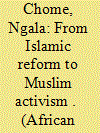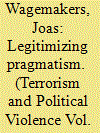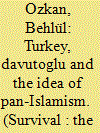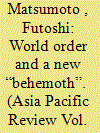| Srl | Item |
| 1 |
ID:
107580


|
|
|
|
|
| Publication |
2011.
|
| Summary/Abstract |
Understanding human terrain exhibited in historical and cultural attributes offers strategic thinkers a critical but often neglected tool. This article provides a cogent example in Hezbollah with the definition of a distinct identity, the adoption of an Islamist ideology, the designation of strategy to meet tangible objectives, and the manifestation of the tactics used to achieve those specified objectives. The analysis highlights the pertinent role of understanding the activation of identity in future conflict scenarios.
|
|
|
|
|
|
|
|
|
|
|
|
|
|
|
|
| 2 |
ID:
168273


|
|
|
|
|
| Summary/Abstract |
This article traces the evolution of an Islamist ideology in Kenya’s public discourse, putting Islamist ideas within a longer history of Muslim politics than most other studies. Specifically, it examines internal debates amongst the minority Muslim population of Kenya, and debates between Muslims and the state and Muslims and the wider Christian public, regarding how to improve the Muslim condition in a Christian-dominated country. The immediate background for the emergence of Islamist ideas is then discussed through an examination of trends since the 1990s, including increased contestations of religious and political authority, and responses to Muslim activism by the state and the wider Christian public. The article concludes that Islamist politics in Kenya, and elsewhere, are more often than not a result of local histories as much as they are part of a global Muslim ‘victimization’ narrative.
|
|
|
|
|
|
|
|
|
|
|
|
|
|
|
|
| 3 |
ID:
097176


|
|
|
|
|
| Publication |
2010.
|
| Summary/Abstract |
This article shows how Hamas legitimized its policy choices during the Al-Aqsa intifada and the Gaza war. The organization's policy moved from violent during the initial stages of the uprising to more moderate during later years. While this entailed huge changes in the organization's course of action, Hamas nevertheless always managed to frame its choices in a way that seemed consistent with its long-held beliefs. The same occurred during the Gaza war, when Hamas moderated its discourse even further. This shows Hamas' flexibility and pragmatism but also that seemingly rigid ideological views can change quite dramatically when circumstances change too.
|
|
|
|
|
|
|
|
|
|
|
|
|
|
|
|
| 4 |
ID:
132472


|
|
|
|
|
| Publication |
2014.
|
| Summary/Abstract |
Turkey's foreign minister was the first intellectual to devise a rationalistic and pragmatic Islamist foreign policy. Five years in office have exposed a huge gap between his ambitions and the country's ability to achieve them.
Over the past decade, Turkey's foreign policy has been synonymous with Ahmet Davutoglu and his doctrine of 'stratejik derinlik' (strategic depth). In 2010-11 he was on Foreign Policy's list of the 'Top 100 Global Thinkers'. Yet, despite this popular interest in Davutoglu, there are few academic studies of his foreign policy. He devised Turkey's current, pan-Islamist approach in his work as an academic during 1986-2002, detailing his vision in hundreds of articles published in that period. Davutoglu consistently argued that the end of the Cold War provided Turkey with a historic opportunity to become a global power, as long as it followed an expansionist foreign policy based on Islamist ideology. According to Davutoglu, Turkey was to dominate its hinterland - the Middle East, the Balkans and the Caucasus - and thereby create a new Lebensraum (he uses the Turkish words 'hayat alani', which is a direct translation of the German Lebensraum, or 'living space'). He began to turn his pan-Islamist vision into reality after 2002, following his appointment as foreign-policy adviser to the ruling Justice and Development Party (AKP), a position he held until he was made foreign minister in 2009.
|
|
|
|
|
|
|
|
|
|
|
|
|
|
|
|
| 5 |
ID:
138754


|
|
|
|
|
| Summary/Abstract |
The emergence of “Islamic State” or “Daesh”1 as abbreviation of “Islamic State in Iraq and al-Sham” in Arabic now poses a strategic challenge to the international community. Given a number of emerging issues such as “war” in the eastern states of Ukraine and assertive actions of China in East Asia, it requires a sober reflection on strategic thinking before embarking upon any tactical and operational measures vis-à-vis these challenges. This article treats the critical value of the Westphalian order based on a sovereign state system by distinguishing three challenges we face at this juncture: namely Daesh, Russia, and China and suggests ways to fight Daesh from a strategic point of view.
|
|
|
|
|
|
|
|
|
|
|
|
|
|
|
|